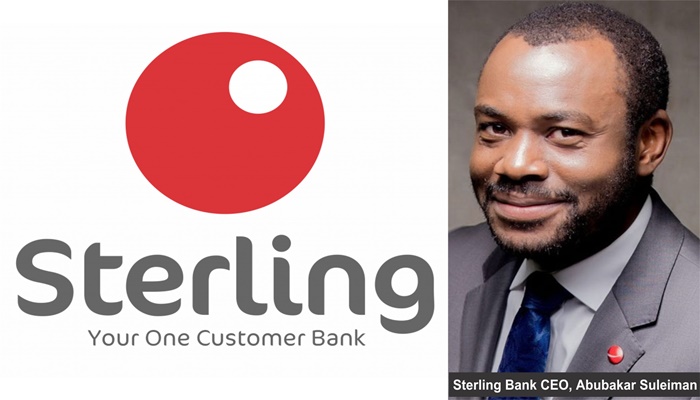Collaboration will deepen Non-Interest Finance in Nigeria – Sterling Alternative Finance

Leaders of thought drawn from non-interest banks, issuing houses, development finance institutions, insurance companies and law firms, among others, have agreed to work together to deliver big ticket non-interest finance deals in the Nigerian market.
The decision was part of the key resolutions at the inaugural Non-Interest Finance Executive Forum hosted by the Sterling Alternative Finance Group in Lagos themed “Delivering large ticket and sophisticated deals through Non-Interest Finance.”
In his keynote address, Managing Director and Chief Executive Officer (MD/CEO) of Sterling Bank, Mr. Abubakar Suleiman, observed that despite the huge potentials inherent in Non-Interest Banking, the Nigerian economy has yet to tap into it to fund its huge infrastructural deficits.
Suleiman who was represented by the bank’s Executive Director of Commercial Banking, Mr. Tunde Adeola, remarked that since the advent of alternative finance in Nigeria, the Federal Government of Nigeria (FGN) had only used it twice to raise Sukuk. He added that only the Osun State Government has used the option to finance infrastructure among state governments till date.
He said a lot of work still needs to be done through collaboration among players in the Non-Interest Finance industry to deepen the market in order to handle large ticket transactions. He noted that, from a marketing perspective, it would be better to push the Non-Interest Financing option as ethical funding in a bid to make it appealing to all customers.
Dr. Basheer Oshodi, Group Head, NIB, Sterling Alternative Finance, remarked that the market for alternative finance is still in its infancy and struggling to grow as expected, adding that there is a need for asset expansion, easy flow of liquidity and risk appetite alignment among players in the industry.
He listed some of the contracts that could be used to finance asset classes in the Nigerian economy to include Musharaka and Mudarabah (equity-based); Wakala (service-based); Ijarah and Murabaha (debt-based).
The Group Head also expressed hope in the ability of operators to immediately pull together large amount of resources that would enable them to finance major assets as soon as documentations were completed.
He described Musharaka as an agreement between two or more partners to combine assets, services, obligations or liabilities for the purpose of making profit while Mudarabah is a partnership in which one partner provides capital and the other provides labour and business expertise.
According to him, Wakala refers to a contract where a principal authorizes or appoints an agent to do a well-defined legal action on his behalf while Ijarah is to give a usufruct on lease or provide services for defined rentals. He explained that Murabaha is a sales contract where the buyer and the seller agree on the mark-up or cost-plus price for the item being sold.
According to Oshodi, there is a need to set up a committee made up of professionals in different segments of the industry to come up with procedures and processes on how to scale the market.
In his presentation on, “Liquidity Management of Non-Interest Financial Institution”, Alhassan Abdulkarim, Regional Manager, Jaiz Bank Plc, outlined how to create an inter-bank market for alternative finance so that operators in Non-Interest Banking could be able to lend money among themselves like what obtains in conventional banking.
According to him, such a measure will enhance liquidity among operators of Non-Interest Banking who sometimes do not have liquidity to meet their customers’ demands because of the peculiarity of their investments.
Mrs. Hajara Adeola, MD/CEO of Lotus Capital, spoke on the need to address risks, documentation and securisation of assets, adding that Musharakah Sukuk can be used effectively to provide mass housing estates while Ijarah Sukuk can be used to effectively finance road construction.
She stressed the need for standard contracts, adding that there was a need for operators to work with some major obligors in a bid to create sustainable market for alternative finance in the country. She called for the formation of an association of operators of NIB that would see to the development of drafts that can be used to execute deals.
Other presentations at the forum included, “Market and Legal Consideration for Syndicated Sukuk” by Tosin Ajose, Lead Advisor with Deal HQ Partners; “Contracts in the Replacement of Existing Projects/Assets” by Banwo & Ighodalo, Metropolitan Law Firm and Udo Udoma & Bello Osagie and “Guaranteed Opportunities for Projects & Sukuk” by Daniel Mueller, Head, Origination & Structuring with InfraCredit.
Non-Interest Finance is based on the principles of profit and risk sharing, transparency in pricing, equitability, fairness and a business model that prohibits uncertainty. InfraCredit provides local currency guarantee, to enhance the credit quality of debt instruments issued to finance credit worthy infrastructure assets that conform to its eligibility criteria.
The World Bank reported recently that Non-Interest Finance was growing at an exponential rate in other parts of the world with total assets in the region of $2.2 trillion as at the end of 2018.






